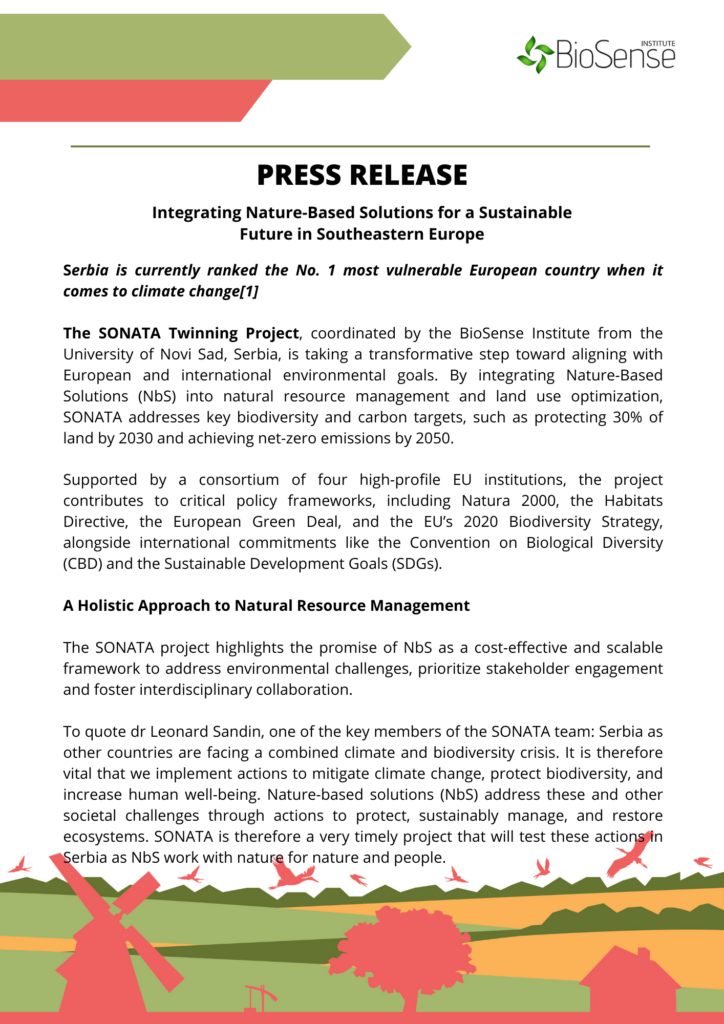Address
304 North Cardinal St.
Dorchester Center, MA 02124
Work Hours
Monday to Friday: 7AM - 7PM
Weekend: 10AM - 5PM
Address
304 North Cardinal St.
Dorchester Center, MA 02124
Work Hours
Monday to Friday: 7AM - 7PM
Weekend: 10AM - 5PM

The SONATA Twinning Project, coordinated by the BioSense Institute from the University of Novi Sad,
Serbia, is taking a transformative step toward aligning with European and international environmental goals. By integrating Nature-Based Solutions (NbS) into natural resource management and land use optimization, SONATA addresses key biodiversity and carbon targets, such as protecting 30% of land by 2030 and achieving net-zero emissions by 2050.
Supported by a consortium of four high-profile EU institutions, the project contributes to critical policy frameworks, including Natura 2000, the Habitats Directive, the European Green Deal, and the EU’s 2020 Biodiversity Strategy, alongside international commitments like the Convention on Biological Diversity (CBD) and the Sustainable Development Goals (SDGs).
The SONATA project highlights the promise of NbS as a cost-effective and scalable framework to address environmental challenges, prioritize stakeholder engagement and foster interdisciplinary collaboration.
To quote dr Leonard Sandin, one of the key members of the SONATA team: Serbia as other countries are facing a combined climate and biodiversity crisis. It is therefore vital that we implement actions to mitigate climate change, protect biodiversity, and increase human well-being. Nature-based solutions (NbS) address these and other societal challenges through actions to protect, sustainably manage, and restore ecosystems. SONATA is therefore a very timely project that will test these actions in Serbia as NbS work with nature for nature and people.
By focusing on Vojvodina’s intensively used agricultural landscape, SONATA aims to develop a sustainable resource management model that can be replicated across Southeastern Europe, while emphasizing the integration of biodiversity into economic planning and decision-making processes.
Nature-Based Solutions harness the power of ecosystems to deliver environmental, social, and economic benefits. By, e.g., restoring wetlands, reforesting degraded landscapes, and implementing green infrastructure via strategically planned land use optimization, NbS offers a path to mitigate climate change, enhance biodiversity and food production, and improve community resilience.
To ensure lasting impact, SONATA fosters collaboration among scientists, policymakers, farmers, and conservationists from land use sector, promoting a shared understanding of how NbS address climate and biodiversity challenges. By integrating cutting-edge data analytics and technology, SONATA sets a benchmark for southeastern Europe in adopting science-driven, inclusive, and effective solutions.
To stay tuned on SONATA’s progress and impact, follow us on our official channels:

SONATA is a three-year Horizon Twinning Green deal project coordinated by the BioSense Institute, University of Novi Sad, Serbia, in collaboration with leading EU institutions – VITO from Belgium, NINA from Norway, UNIOVI and FIHAC from Spain. These institutions will boost BioSense’s S&T capacity and strengthen research management and co-development with land use multi-actors by fostering knowledge exchange and training for researchers and staff.